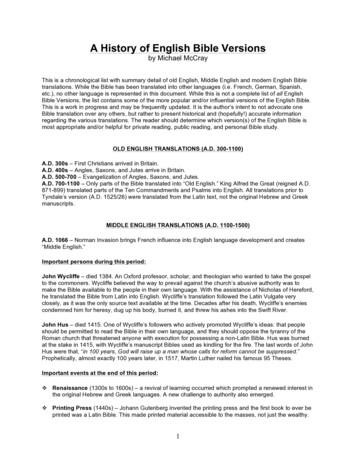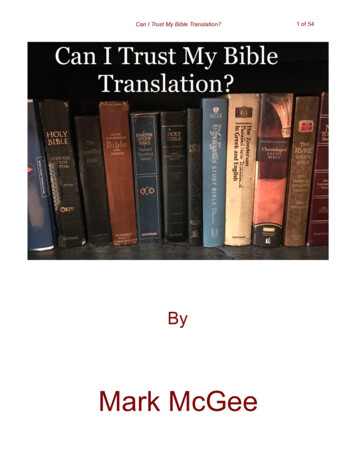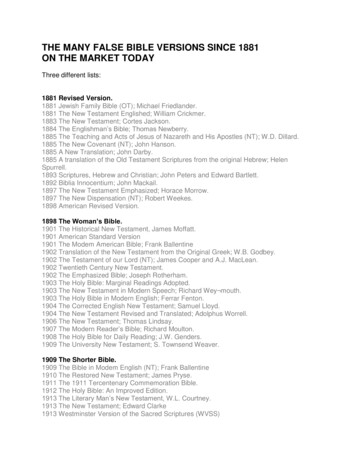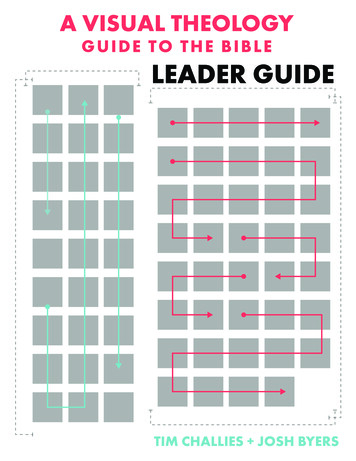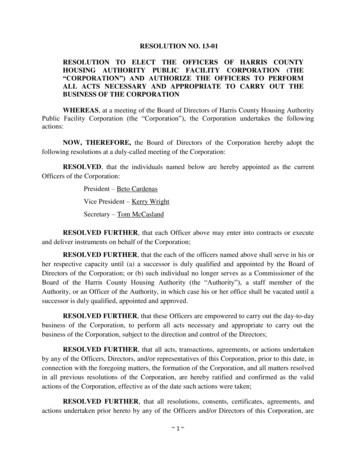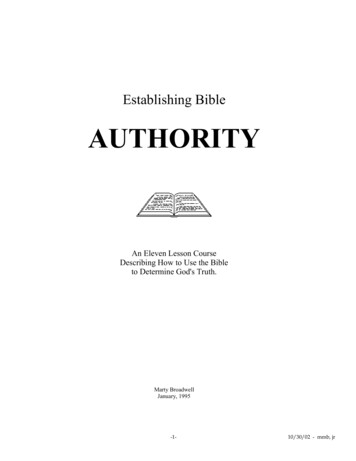
Transcription
Establishing BibleAUTHORITYAn Eleven Lesson CourseDescribing How to Use the Bibleto Determine God's Truth.Marty BroadwellJanuary, 1995-1-10/30/02 - mmb, jr
Authority Course RoadmapIntroductory IdeasThe Concept of AuthorityFaith, Reason, & Authority12Alternative Uses ofThe Bible in ReligionAuthority of the Bible34Old Testament Patterns5New Testament ClaimsEstablishing AuthorityOld & NewTestamentExamplesPostulates& Principles6Practical Examples8Morality79Worship11Church ActivityBible StudyMethods & ToolsReview1012-2-10/30/02 - mmb, jr
Establishing Bible AuthorityCourse Description*Purpose1.To explain and build a faith in the Bible as absolute authority in religious matters.2.To develop skills of Bible study and interpretation to enable class members to investigate and establish truth onkey religious questions.Approach1.Define what is meant by the term Authority, and show that we are all familiar with using authoritative writingto discover truth. (Lesson 1)2.Illustrate that the interpretation and use of instructions is determined by our opinion of the qualifications of thewriter. (Lesson 1)3.Show that one must first establish a confidence in the Bible's authorship and characteristics, and then further(non-provable) conclusions can be drawn about history and theology. (Lesson 2)4.Describe the various views of authority in religion, emphasizing (by contrasts and example) that the worship ofan omnipotent, omniscient God requires a conviction of His absolute authority. (Lesson 3)5.Discuss alternative methods of Bible interpretation, showing the fallacy of each: interpretation by theChurch/Priest; miraculous/Holy Spirit-led enlightenment; feeling-based or mystical revelation; “updating”the teaching by abstracting some of the principles while rejecting the specifics; and allegorizing or“debunking” of supernatural content. (Lesson 3)6.Show that the Bible text itself, and Jesus’ use of Scripture, assume that it is absolute and authoritative.(Lessons 4 and 5)7.Show by both Old and New Testament examples that religious practice was established by examination andadherence to the written word. (Lessons 4 and 5)8.Show, by examples that the reasoning required to arrive at Bible truth is the same as is required in all lines ofnormal, logical investigation. (Lesson 6)9.Demonstrate, using practical issues, the how the Bible should be studied and how truth on particular issuesshould be determined. (Lessons 7, 8, 9, and 10)10. Give practical experience in a few of the basic tools of Bible study. (Lesson 11)Lesson Titles1.The Concept of Authority2.Faith, Reason, and Authority3.Alternative Uses of the Bible in Religion4.Old Testament Patterns5.New Testament Claims6.Examples of Establishing Authority7.Postulates and Principles of Bible Interpretation8.Practical Issues and Examples: Personal Morality9.Practical Issues and Examples: Worship10. Practical Issues and Examples: Church Activity11. Bible Study Methods and ToolsReview & Quiz*All material contained in this course is free to be used, with or without modification, for anyteaching purposes. No permission or acknowledgement of source is required or requested.-3-10/30/02 - mmb, jr
Lesson Content Summaries1.The Concept of Authority-2.Faith, Reason, and Authority-3.-The Nature of WorshipPrayerThe Lord's SupperSingingPractical Issues and Examples: Church Activity-11.ConversionSexual ConductHonestyPractical Issues and Examples: Worship-10.Postulates and Principles about God's Revelation (from Lessons 4-6)Postulates and Principles about interpreting God's Word (from Lessons 4-6)Exercise in interpreting of authoritative texts.Practical Issues and Examples: Personal Morality-9.Jesus at the TemptationsOther Examples of Jesus' Use of ScriptureEstablishing Practice in the Early Church: Early Issues & Apostles' InstructionsThe presence of patterns in the New Testament teaching and practice.Postulates and Principles of Bible Interpretation-8.Jesus' use of the Old Testament, as: History, Moral Law, Worship, ProphecyApostles' view of the Old Testament, its: Value & Purpose, History, AuthorshipNew Testament Writers' view of New Testament textExamples of Establishing Authority-7.Revelation and nature of the Law of Moses (Constant over time)The Pattern of Obedience: Moses Instructions & Solomon, Nehemiah, JosiahExamples of Disobedience: Nadab & Abihu, Jeroboam, David, UzziahAdditional Revelation to ComeNew Testament Claims-6.Supplemented (by tradition, church teachings, miraculous, or spirit-guided)Filtered by own Experience (self-guided/non-rational; debunking the super-natural; liberalism/higher criticism;Proving only what is already believedRecognizing various approaches to the use of the Bible textOld Testament Patterns-5.Review of Exercise on various sources (& credibility) of informationProper Sequence of Conclusions (John 10); “Inductive” vs “deductive” faith.Confidences in Scripture: transcendent, inerrant, propositional, internal agreement, complete, survival, compatiblewith human reason &free willAlternative Uses of the Bible in Religion-4.Definition of the term AuthorityAuthoritative Writing (with example exercise)Establishing Authority in ReligionCollective and Individual ActivityEvangelismCare for the NeedyBible Study Methods and Tools-A Method for Finding Bible TeachingTools and advantages/disadvantages of each-4-10/30/02 - mmb, jr
Lesson Objectives (The Student Should be able to )1. The Concept of Authority- List three uses of the term "authority".- Show how all three uses are relevant to a study of Bible Authority.- Explain how the attitude toward the source determines how information is accepted and used.2. Faith, Reason, and Authority- Put in order the sequence of conclusions that lead us to accept the unprovable in scripture.- Explain the role of reason in establishing inspiration, then accepting the Bible's conclusions.- List the additional conclusions one must draw about the Bible if he believes it is from God.3. Alternative Uses of the Bible in Religion- List three different ways in which the Bible is used by various religious groups.- Determine, from commonly made statements, how a person views the text of the Bible.4. Old Testament Patterns- Describe the way in which the Law of Moses was to be communicated and preserved.- Describe the way in which proper worship and practice could be restored by the rulers of Israel.- Give three examples of disobedience to the Law of Moses, and explain how it was violated.5. New Testament Claims- Describe how Jesus viewed the Old Testament history and law.- Describe how the New Testament writers viewed the Old Testament scriptures.- Describe how the New Testament writers viewed the New Testament writings.6. Examples of Establishing Authority- List three principles of interpretation of scripture illustrated by Jesus at the temptations.- List two other principles of interpretation of scripture that come from other events in Jesus' life.- Give examples of the way apostolic teaching was used to set patterns in the early church.7. Postulates and Principles of Bible Interpretation- List four principles that are used to establish Bible authority from the scriptures.- Give examples of explicit commands, precedent-setting example, and underlying principle.- Give an example of a restrictive specific8. Practical Issues and Examples: Personal Morality- Illustrate the use of the procedure suggested in Lesson 7 to show what to do to be saved.- Illustrate what is meant by a restrictive specific from Jesus' teaching on marriage & divorce.9. Practical Issues and Examples: Worship- Illustrate the use of Old Testament patterns in determining what is proper worship.- Determine, using the Bible, what is the proper observance of the Lord's Supper.10. Practical Issues and Examples: Church Activity- Illustrate, using Bible examples, the distinction between individual and collective action.- Give Bible examples of three types of church activities.11. Bible Study Methods and Tools- Describe a sequence of steps to determining what the Bible teaching on a specific subject.- Describe the use of five different tools, beside the Bible text, and explain the advantages and disadvantages of each.-5-10/30/02 - mmb, jr
Lesson 1 - The Concept of AuthorityA.B.C.Definition of Authority1.The Greek word exousia (εξουσια) comes from the root word which means “it is lawful". The wordhad a range of meanings, including:- the power of authority, right to exercise power (Rom 13:1; Acts 1:7; Matt 8:9)- having the ability or strength to do something (Mark 2:5-12)- permission or right to do something (I Cor 9:4-12; Heb 13:10)2.Similar usage of the word in English:- “He has lots of authority in the company”- “He’s an authority on the subject”- “We have authority to do this,” “By the authority vested in me.”3.Our study includes all three concepts:- God is the source of all power, authority (Dan 4:34,35; Rom 13:1)- Jesus demonstrated abilities & qualifications (John 10:18; Mark 1:22,27)- Many acted on the basis of authority (power and rights) granted by God:Jesus (Matt 21:23; 28:18)Apostles (Acts 1:8; II Cor 13:10; II Thes 3:9)Christians (John 1:12; Rev 22:14)Authoritative Writing1.What do we mean by authoritative documents? How does that relate to “having authority to dosomething?”2.Do the exercise on the use of Authoritative texts.3.What determines whether we take a document as authoritative? Does our attitude toward the textinfluence:a. the care with which we read it?b. the importance we place on the information?c. the degree to which we trust its correctness and accuracy?d. the strictness with which we follow it?e. the necessity we feel to understand and agree with all the information?e. the degree to which we may modify it ?Establishing Authority in Religion1.What do we mean by “establishing authority” to do something in religion? Which of the three definitionsis the closest to this concept?2.Consider the question Jesus ask the Pharisees in Matt 21:23-27. What are the implications of Jesus’ twochoices.3.Is the way in which we read, interpret, and obey the Bible a statement about our attitude toward itsauthor?4.Do the exercise (in class) on interpreting the simple four-step instructions.-6-10/30/02 - mmb, jr
Definitions of Authority1. Right to Act, Exercise Power, or DetermineRom 13:1 Everyone must submit himself to the governing authorities, forthere is no authority except that which God has established.Acts 1:7It is not for you to know the times or dates the Father has set byhis own authority.Matt 8:9 For I myself am a man under authority, with soldiers under me.Mark 2:7 Who can forgive sins but God alone?2. Ability, Strength, or Qualification to do SomethingMark 2:10 But that you may know that the Son of Man has authority onearth to forgive sins.3. Permission (Delegated Authority) to do SomethingI Cor 9:4-12 If others have this right of support from you, shouldn't wehave it all the more?Heb 13:10 We have an altar from which those who minister at thetabernacle have no right to eat.All Three Uses of "Authority" are Relevant to this study.God is the Source of All Authority.Dan 4:34,35 .He does as he pleases with the powers of heaven.Rom 13:1 . there is no authority except that which God has established.Jesus Demonstrated Abilities and Qualifications.Jno 10:18.I have authority to lay it down and. take it up again.Mark 1:22,27 . he taught them as one who had authority,We Act on the Basis of Authority (Permission) from God.Matt 21:23 (Jesus) "By what authority are you doing these things?"II Cor 13:10; II Thess 3:9 ; Acts 1:8 (Apostles)Jno 1:12; Rev 22:14 (Christians)-7-10/30/02 - mmb, jr
Lesson 2 - Faith, Reason, and AuthorityA.B.Review of Lesson 1 Conclusions1.Based on the exercises in Lesson 1, what is the primary consideration that determines how we interpretand obey some written instructions?2.At what point in the process is it important to decide on the credibility of the source? How is this done?If absolute credibility is established, is it still necessary to confirm, rationalize, or even agree with all ofthe information given from that credible source before it is accepted?3.In this lesson, we will look at the role (and order) of faith and reason in the establishment of religiousauthority.Jesus’ Teaching on the Order of Conclusions (John 10)1. What was the Jew’s primary objection to Jesus? (Jno 10:31-33) Was it possible for them to know, bydirect experience, that Jesus was one with the Father, or did they need to come to this conclusion someother way? How did Jesus suggest they decide on whether to accept His testimony as authoritative? (seevs 25, 37, and 38).C.2.Put the following conclusions in order, based on the incident in John 10 above.Jesus was one with the Father (because He said He was).Jesus’ words, since they were true, were not blasphemy.Jesus must have been accepted and assisted by God.Jesus did miraculous works.Jesus words were authoritative and true.3.Describe the role of reason and faith in the sequence above.Conclusions about the Bible1.Place the following conclusions in their proper order.Prophecies and other evidences of inspiration in the Bible are valid.Adam and Eve were the first man and woman.The writing of the Bible was guided by God.The teachings of the Bible are true.There is a possibility of a supernatural revelation from God.There is evidence that the universe had a supernatural origin.2.For which of the above conclusions was reason required? Is faith involved? How?3.If, by reason, one establishes his own firm conviction that the Bible came to us by the plan of anomniscient, omnipotent God, what else might he conclude about the Bible with regard to:- its completeness (comprehensiveness)- its accuracy- its unity (self consistency)- its importance- its ability to be understood by man- its preservation- its quality, compared to human wisdom- its relevance to all men-8-10/30/02 - mmb, jr
Sequence of Conclusions(John 10:31-33)Is the statement: "I and the Father are one." Blasphemy?Direct observation, withan understanding of thelaws of nature. (For us,it includes an evaluationof Testimony.)A Supernatural Power,and the Cooperation ofthat Power is Requiredto work Miracles.The approval of Godmust also extend to whatJesus Says: So that Hedid speak for God.(A Direct Statement ofJesus.)(A Logical Inferenceto be drawn from thedirect statement.)Jesus didMiracles.Jesus wasApproved ofGod.Jesus'Words areAuthoritative."I and MyFatherare one."Jesus' Wordsare notBlasphemy.Human Observationand Reason Used toReach a ConclusionAbout the Credibilityof Jesus' Teaching.Authority of theJesus' TeachingEstablishedConclusions Acceptedon the Basis of theAuthority of the Source.Reason Employed toUnderstand andApply Information."If I do not the works of My Father, do not believe Me; but if Ido, though you do not believe Me, believe the works, that youmay know and believe that the Father is in Me, and I in Him."John 10:37,38-9-10/30/02 - mmb, jr
Sequence of ConclusionsHuman wonder, logic, moral oughtTranscendence of Natural LawImagination, Hope, Joy.It is Possible thatthere is SupernaturalTemporary UniverseEvidence of BeginningsCause and EffectThe Universe hadSupernatural OriginsOrder and Natural LawHuman Reason & WillThe Universe had anIntelligent, Personal OriginExplanation of ActionMan's moral NatureThere is aPurpose forCreationMan's Ability to Question & AnswerInclination to "seek" GodAuthority of theBible TeachingEstablishedMiracles &Revelationare PossibleThere is a Possibilityof a Divine RevelationCharacteristics of theBiblHistorical AccuracyFulfilled ProphecyQuality of AnswersSurvival, UnitySuccess of the MessageFacts of Jesus'Lif Miracles and the ResurrectionTranscendence of His TeachingThe Effect on the DisciplesThe Fulfillment of PropheciesIt is LikelyThere is aMoral LawThe BibleText isAccurateThe Bibleis InspiredThe Account of Jesus'Life is AccurateJesus is theSon of GodThe Teachingsof the Bible are Truth-10-The Teachingsof Jesus are TruthCreation, Flood, etc.Redemption StoryMoral LawsNature of ManPurpose of ManNature of God, Christ, and Holy SpiritRequirements of WorshipPersonality of JesusComing JudgementHeaven and HellAngels, Demons, Satan.10/30/02 -mmb, jr
Lesson 3 - Alternative Uses of the Bible in ReligionA.B.C.Introduction1.Many people use the Bible in their religious practice; many recognize it has value--but use it only a little;but most disregard it completely. Why is there a difference?2.Is the way in which people use the Bible determined by their convictions about its origin?The Bible and Other Religious Authority1.Many use the Bible as one of many sources for information on God. Think of what might motivatesomeone to agree with each of the following positions about how to use the Bible.a.The Bible is used along other religious and cultural influences and traditions.b.The Bible is accepted, as explained by the Church, along with policies set by the Church.c.The Bible is accepted along with what the Holy Spirit reveals to us directly.d.The Bible produces an "experience" within each person, which helps them find the truth.2.Even when the Bible is accepted as the most important source of religious authority, some feel that itmust be filtered by our knowledge and/or experience. Think of examples of:a.Those who accept the Bible, but modified by our own experience and (better) understanding ofscience, sociology, history, psychology, etc.b.Those who accept the Bible, minus any supernatural elements.c.Those who read and follow only those parts of the Bible which confirm their own pre-existingconvictions.Recognizing Various Views of Bible Authority1.Read the quotes below and determine which point of view the writer is taking toward the use of the Bibleto determine truth and establish practice.a.The ultimate arbiter of theological validity is not reason or experience or the Bible or the Church, butthe movement of history itself--understood theologically: the providence of God. It is this movementwhich in actual fact sorts out the valid from the invalid, the significant from the insignificant.b.I also admit the holy Scriptures, according to that sense which our holy mother Church has held anddoes hold, to which it belongs to judge of the true sense and interpretation of the scriptures; neither willI ever take and interpret them otherwise than according to the unanimous consent of the Fathers.c.Nevertheless we acknowledge the inward illumination of the Spirit of God to be necessary for thesaving understanding of such things as are revealed in the Word.d.For the revelation of which the Bible speaks is always such as has place within a personal relationship.It is not the revelation of an object to a subject, but a revelation from a subject to a subject, a revelationof mind to mind. . The thoughts contained in Scripture are not themselves the content of revelation. .It goes without saying that God is the content of revelation.e.Many Christians have been unsettled by recent questions about male and female roles. Some definethese roles by appealing to instructions in Scripture that were addressed to first century people wholived in a society very different from our own.We have come down to the 1990s with a lot of culturaland ecclesiastical baggage.but we must all agree that these restrictions really are traditional.'To have authority over men' means to domineer.The circumstances of today are different. Careersand independence are open to women, many of whom have had a first-class education. The ableChristian woman of today would not fall into the errors of doctrine to which the women of Paul's daywere prone.f.There are no analogies with [the water-to-wine miracle] in the old tradition of Jesus-stories, and incomparison with them it appears strange and alien to us. There can be no doubt that the story has beentaken over from heathen legend and ascribed to Jesus. . The narrative is the symbol of some-thingwhich occurs throughout the whole of Jesus' ministry, that is the revelation of the δοξα of Jesus.-11-10/30/02 - mmb, jr
Alternative Uses of the Biblea. From a Book on TheologyThe ultimate arbiter of theological validity is not reason or experience or the Bible or the Church, but the movement of historyitself--understood theologically: the providence of God. It is thismovement which in actual fact sorts out the valid from the invalid,the significant from the insignificant.G.D. Kaufman, Systematic Theology: A Historicist Perspective , p xv.The Bible, Plus Tradition & Historyb. Roman Catholic Confession Professio Fidei Tridentinae, pg 3.I also admit the holy Scriptures, according to that sense whichour holy mother Church has held and does hold, to which itbelongs to judge of the true sense and interpretation of thescriptures; neither will I ever take and interpret them otherwisethan according to the unanimous consent of the Fathers.The Bible, Interpreted by the Churchc. Westminster Confession (Article 1.6)Nevertheless we acknowledge the inward illumination of theSpirit of God to be necessary for the saving understanding ofsuch things as are revealed in the Word.The Bible, Illuminated by the Spiritd. On the Nature of Revelation:For the revelation of which the Bible speaks is always such ashas place within a personal relationship. It is not the revelation ofan object to a subject, but a revelation from a subject to a subject,a revelation of mind to mind. (p 24). The thoughts contained inScripture are not themselves the content of revelation. . It goeswithout saying that God is the content of revelation. (pg 33)The Bible, as it produces an"experience" within us.J. Baillie, The Idea of Revelation in Recent Thought.-12-10/30/02 - mmb, jr
Alternative Uses of the Bible (con't)e. On the Role of Women in Public AssemblyMany Christians have been unsettled by recent questionsabout male and female roles. Some define these roles by appealing to instructions in Scripture that were addressed to first centurypeople who lived in a society very different from our own.Wehave come down to the 1990s with a lot of cultural and ecclesiastical baggage. but we must all agree that these restrictionsreally are traditional.Edyth Lane, Image Magazine, Nov 1991.'to have authority over men means to domineer.The circumstances of today are different. Careers and independence areopen to women, many of whom have had a first-class education. The able Christian woman of today would not fall into the errorsof doctrine to which the women of Paul's day were prone.The Bible, Subject to our own(Advanced) UnderstandingR.A. Ward, Commentary on 1&2 Timothy, pg 52.f. From a Commentary on John:There are no analogies with [the water-to-wine miracle] in theold tradition of Jesus-stories, and in comparison with them itappears strange and alien to us. There can be no doubt that thestory has been taken over from heathen legend and ascribed toJesus. . The narrative is the symbol of something which occursthroughout the whole of Jesus' ministry, that is the revelation ofthe δοξα of Jesus.The Bible, Minus AnySupernatural Events.R. Bultmann, The Gospel of John, p 330,331.-13-10/30/02 - mmb, jr
Alternative Uses ofthe Bible in ReligionSupplemented Use of the BibleTraditionalistThe Bible Plus TraditionEcclesiasticistThe Bible -- Received and Understoodonly through the ChurchCharismaticThe Bible Plus what the Spirit Revealsto Us Directly.MysticistThe Bible, as it Produces anFiltered by Our Own ExperienceRationalistThe Bible, but Subject to our ownExperience and (Better) Understandingof Science, Sociology, History, etc.MaterialistThe Bible, Minus Supernatural Elements(including: miracles, God-ControlledEvents, and Direct Revelation)ObscurantistUse of only those Parts of the Biblewhich Confirm Pre-existing Convictions-14-10/30/02 - mmb, jr
2.The following are a set of commonly heard phrases or statements. Read each and determine whichapproach is implied.a.b.c.d.e.f.g.h.i.j.k.l.m.n.o.p.q.D.What does your church believe about.Most denominations have changed their teachings about.If I accepted that, I’d be going against my mother and father.Everyone has a right to his own interpretation. to decide what’s right for him.My preacher tells me that its wrong to do those things.The Bible speaks in different ways to different people.We follow christian practices which have remained unchanged for centuries.The Southern Baptist Association is meeting to determine their position on .The Spirit led me to move to Atlanta to open a Christian School.The teachings of the church are out of date with our culture.I know the Bible says that, but in my heart I know.I just don’t believe a loving God would send anyone to Hell.Mark, the seminal gospel, originated the miracle-story as an element of Christian literature, whichwas then copied by the later gospel authors.The Bible emphasizes love and says “judge not,” so why are you condemning.I’ve been in the church of Christ for 60 years, so don’t go quoting scripture to me.As I read the scripture, I just felt God was leading me to.I just can’t accept the story of the flood, its just not scientific.The Real Source of Authority1.When tradition, the church, or our own views do not agree with what we read in the Bible, what decisionmust we make? If we take the alternative position, what is our real source of authority?"The fact is that here we are faced in principle with a choice between two versions of Christianity.It is a choice.between a Christianity that is consistent with itself and one that is not; in effect,between one that is wholly God-given and one that is partly man-made. We have to choosewhether to bow to the authority claimed by the Son of God, or whether on our own authority todiscount and contravene a part of His teaching; whether to rest content with Christianityaccording to Christ, or whether to go hankering after a Christianity according to the spirit of ourage; whether to behave as Christ's disciples, or as His tutors. We have to choose whether we willaccept the biblical doctrine of Scripture as it stands, or permit ourselves to re-fashion it accordingto our fancy. We have to choose whether to embrace the delusion that human creatures arecompetent to judge and find fault with the words of their Creator, or whether to recognize this ideafor the blasphemy that it is and drop it. We have to decide whether we are going to carry throughour repentance on the intellectual level, or whether we shall still cherish our sinful craving for athought-life free from the rule of God. We have to decide whether to say that we believe theBible and mean it, or to look for ways whereby we can say it without having to accept all theconsequences." (J. J. Packer, 'Fundamentalism' and the Word of God, p 170.)2.If one reaches the conclusion that the Bible is from God, he must then examine what the Bible saysabout itself. What are some of the claims it makes for itself, and the way God intends for it to be used.(II Tim 3:16,17; II Pet 1:20,21; Jude 3)-15-10/30/02 - mmb, jr
Lesson 4 - Old Testament PatternsA.B.C.D.Value and Purpose of the Old Testament Record1.Having accepted the inspiration of the Bible text, one is faced with handling the two very distinct partsof it: the Old and New Testaments. For whom were the writings of the Old Testament specificallyintended ? (Dt 5:1-3 and see Mark 12:29; and, for example Amos 3:1,2; Rom 3:1,2)2.What is the intended scope of the New Testament teaching? (Matt 28:18-20; Acts 1:8; 10:34-36)3.What value is the Old Testament record to us? (Gal 3:24-25; Rom 15:3,4; I Cor 10:6,11)The Revelation and Nature of the Law of Moses1.Who wrote the first five books of the Bible? What kind of teaching is contained in them? (see Mark12:26; Neh 13:1,2; II Chron 25:4)2.Describe some of the miraculous events that occurred during the deliverance of the Israelites from Egyptand their journey to Mt Sinai. (Scan Ex 3-18)3.Describe the events at Sinai (see Ex 19:16-20). Was Moses’ authority to write these books of Lawconfirmed by God? How? Was the history leading up to the giving of the Law important to establishingits authority? (Dt 6:20-25) Why?4.In what form was the revelation to Moses to be preserved? (Ex 34:27-28; Dt 27:4-10; Dt 31:22-26) Bywhat activity was it to be transmitted? (Dt 31:9-13)5.How was the Law to be used after Moses' death? (Dt 31:9-11; 32:44-47)6.(Thought Question:) Were there other times in the history of Israel when miracles were as striking or asfrequent? (see Dt 34:10-12) Why do you think this is so?The Pattern of Obedience1.After Moses’ death, by what would Joshua lead? (Josh 1:7,8, and see 8:34,35)2.How was Solomon’s reign to be judged? (I Kings 3:14)3.Long after the kingdom was divided, government corrupted, and religious practices forgotten, how wasit possible to restore proper worship to God?4.How did Josiah respond to the reading of the uncovered book of Law? (II Kings 22:8-13; 23:1-3,21-25)5.How did Nehemiah and Ezra go about changing the behavior of the remnant that returned from captivity(Neh 8:1-3; 8; 13-18)? Did the reading have an effect? (Neh 9:1-3; Ezra 9:2-4, 10:1-4)Examples of Disobedience. Study these examples and note how the Law was broken.1.Nadab and Abihu - Lev 10:1,2 (and see Lev 16:12)2.Jeroboam - I Kings 12:28-33; II Chron 13:8-11 (and see I Kings 14:16)3.David - II Sam 6:3,6,7; I Chron 15:12-15 (and see Ex 25:14; Dt 10:8)4.Uzziah - II Chron 26:16-21What time period do these examples span? Was there to be a variation in the Law, or the way it was kept, asculture, government, and circumstances changed?-16-10/30/02 - mmb, jr
Old Testament Examplesof DisobedienceWhoThe ActionNadab& Abihu".Offered Fire WhichHe had not Commanded."Lev 10:1,2JeroboamI Kings 12:28-33II Chron 13:8-1 Wrong Time? (v 14,16)Not Specified Wrong Source? (16:12)Not Specified Wrong Incense? (Ex 30:9)ForbiddenMade golden CalvesForbiddenSet up Worship at Dan &BethelN
7. Postulates and Principles of Bible Interpretation 8. Practical Issues and Examples: Personal Morality 9. Practical Issues and Examples: Worship 10. Practical Issues and Examples: Church Activity 11. Bible Study Methods and Tools Review & Quiz *All material contained in this course



